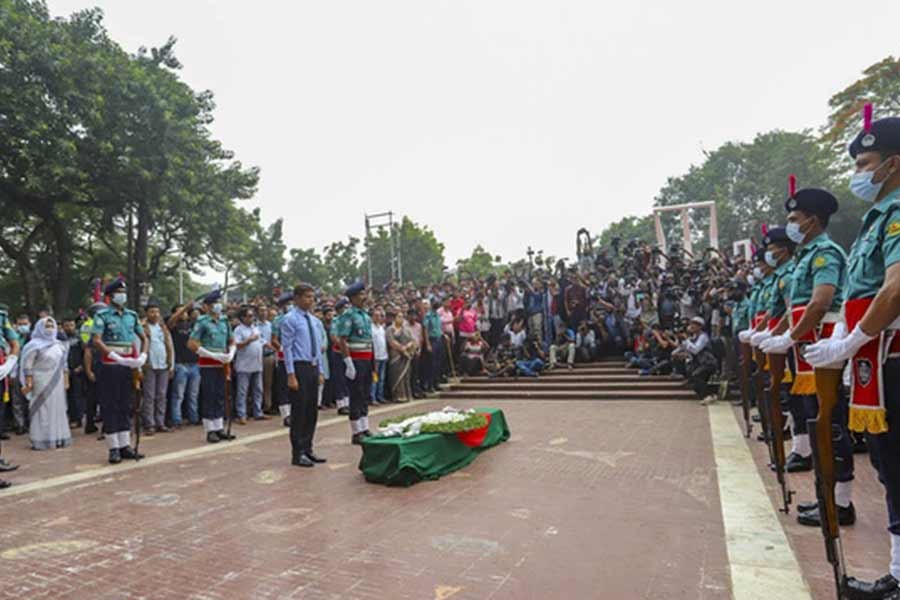The mortal remains of Abdul Gaffar Chowdhury have been brought to Dhaka’s Central Shaheed Minar, where every year Bangladeshis pay tribute to the Language Movement using the song he penned – ‘Amar Bhaier Rokte Rangano’.
The body of the journalist and columnist was brought to the Shaheed Minar on Saturday afternoon for the public to pay their final respects, reports bdnews24.com.
The 88-year-old had died at a hospital in the UK on May 19. His body was brought by air to Dhaka on Saturday.
At 1:00 am, his coffin arrived at the Shaheed Minar. He received a ‘guard of honour’ as a freedom fighter. A moment of silence was observed to commemorate his passing.
Then the Shaheed Minar filled with the sound of his song ‘Amar Bhaier Rokte Rangano’ – a tribute both to its lyricist and the brave Language Martyrs.
Flowers were presented on behalf of President Md Abdul Hamid by his Military Secretary Major General SM Salahuddin Islam and for Prime Minister Sheikh Hasina by her Military Secretary Brigadier General Kabir Ahmed. Speaker of the Parliament Shirin Sharmin Chaudhury also presented her respects.
“He highlighted the history of the Language Movement and our fight for independence to the people,” the speaker said. “He has also given us many perspectives and instructions through his writing. The void he leaves behind will not be easy to fill.”
“As long as the spirit of Feb 21 is alive, the Bengali people will remember Abdul Gaffar Chowdhury through his song ‘Amar Bhaier Rokte Rangano Ekushey February’.”
An Awami League delegation led by General Secretary Obaidul Quader also paid its respects.
“A stalwart giant of our culture has departed,” Quader said. “Though he is no longer with us, he will live forever through his immortal Ekushey song.”
People from all walks of life and from various political, social and cultural organisations came to pay their respects to Chowdhury at the Shaheed Minar until 3 pm.
“My father loved Bangladesh,” said his son, Anupam Ahmed Reza Chowdhury. “He knew the people of Bangladesh loved him as well. He always told us he wanted to be buried in this country, so we have brought him.”
“Many people have come to pay their respects to him. I thank you all. I will also be forever grateful to Prime Minister Sheikh Hasina for the respect she has shown my father.”
From the Shaheed Minar, Chowdhury’s coffin was taken to the Dhaka University Central Mosque for funeral prayers and then to the Jatiya Press Club.
The body will later be laid to rest at the Martyred Intellectuals Graveyard in Mirpur.
Chowdhury’s mortal remains reached Dhaka aboard a Biman Bangladesh Airlines plane at 11 am on Saturday.
A delegation which included Liberation War Affairs Minister AKM Mozammel Huq, Agriculture Minister Muhammad Abdur Razzaque, Railways Minister Md Nurul Islam Sujan, State Minister for Aviation Md Mahbub Ali, Awami League Presidium Member Mofazzal Hossain Chowdhury Maya, and Awami League Office Secretary Biplob Barua were present at the airport to receive the body.
Bangladesh’s national flag was draped over the coffin after it was taken off the airplane. The delegation then paid their respects to the departed writer by presenting flowers.
“Abdul Gaffar Chowdhury was a witness to history. People always waited patiently to hear from him,” said AKM Mozammel Huq.
The 88-year-old’s first funeral prayer service was held at Brick Lane Mosque in London on May 20.
Chowdhury received the Independence Award, Bangladesh's highest civilian honour, in 2009.
He was the editor-in-chief of the weekly Joybangla, the mouthpiece of the Mujibnagar government of 1971. Though he had lived in London since 1974, he was always vocal in support of the Liberation War, Bangabandhu and liberal values.
Despite living abroad, he regularly wrote political commentary and discussed contemporary issues in Dhaka newspapers. He also wrote poems, stories, novels, plays, memoirs and essays.
Chowdhury suffered from diabetes and kidney disease. He was admitted to Northwick Park Hospital in London two months ago.


